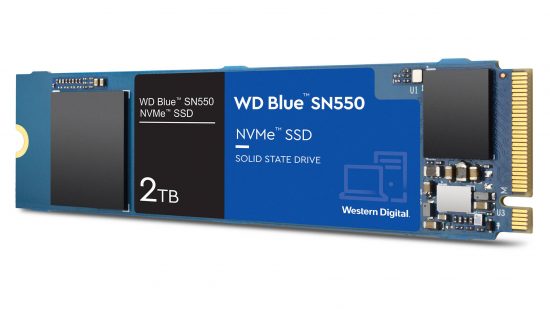Our Verdict
80%Still worth considering for those on a tight budget, but you can get a much faster drive for just a little more money.
The WD Blue SN550’s prices of just $83 for 1TB and $180 for a whole 2TB of storage show that owning an NVMe PCIe 3 SSD is now cheaper than ever. Considering there are vanishingly small real-world performance returns with the very latest and fastest SSDs, this makes these older PCIe 3 drives still well worth getting.
That said, if you dig deeper into the specs, this drive does have a relatively small DRAM cache and miniscule SLC cache that’s typically just a few gigabytes in size, even for the 2TB model we tested. This is a lot less than most more modern high-end drives – even the more budget-focused Samsung 980 has over 150GB of SLC cache to boost write speeds when dealing with large workloads.
In perfect conditions, dipping only into its small SLC cache, the SN550 can write data at 1,800MB/s, but that will quickly drops to SATA-level performance if you’re writing just a few tens of gigabytes. That’s not likely to be an issue for storage workloads that are largely read-focused, but it could waste a lot of time if you intend to shift around large files regularly.
You certainly won’t need to worry about cooling, though – the Blue SN550 only hit 64°C in our stress test, which is well away from thermal throttling, although the SSD itself isn’t particularly attractive if you want to show off your PC’s interior. That’s a far cry from the monstrous SN850, which rocketed up to 90°C in the same test. The ADATA XPG GAMMIX S50 Lite, which is closest in price at under $120, also required a heatsink.
For an extra $35, though, the ADATA XPG GAMMIX S50 Lite does offer quite a bit more if you can keep it cool using your motherboard’s heatsinks. It has a DRAM cache, as well as a sizeable SLC cache of several hundred gigabytes, meaning it’s far more flexible when it comes to dealing with large files, and won’t leave you waiting as it writes them either.
The ADATA drive offered significantly quicker read speeds than the WD Blue SN550 too, with CrystalDiskMark’s sequential test seeing a read speed of 3,858MB/sec compared to 2,603MB/sec for the SN550, while its write speed was nearly twice as fast, even when the SN550 was able to make use of its small SLC cache. The 4K random tests saw the drives perform more evenly, but once again in AS-SSD’s 4K 64-thread test, the ADATA drive was significantly faster at both reading and writing than the SN550.
WD Blue SN550 pros and cons
Pros
- Less than £85 for 1TB
- Good read speed for the cash
- No heatsink required
Cons
- Much faster SSDs cost just £30 more
- No DRAM cache
- Tiny SLC cache
WD Blue SN550 specs
The WD Blue SN550 specs list is:
| Interface | PCIe 3 |
| Capacities | 250GB, 500GB, 1TB |
| Max sequential read/write speed | Up to 2,400MB/s / 1,950MB/s (1TB) |
| Max random read/write speed | Up to 410K/405K IOPs (1TB) |
| Controller | WD in-house |
| Endurance rating | Up to 600TBW (1TB) |
| Warranty | Five years |
| NAND | TLC |
WD Blue SN550 price
Price: Expect to pay $180 for 2TB, $83 for 1TB
WD Blue SN550 review conclusion
As a read-speed-focused, affordable SSD, the SN550 still makes sense for people building a budget system. It offers incredibly good value and can wipe the floor with a SATA SSD in many situations – it may be slower than higher-end NVMe competition, but it can still hit speeds well over the 550MB/sec SATA limit.
The main issue for the SN550 is that you only need to spend $30 more to get the ADATA XPG GAMMIX S50 Lite, which is a far better buy. It has better speeds across the board than the WD Blue SN550, and a vast SLC cache by comparison, allowing it to deal effectively with all manner of workloads.
Looking for more storage upgrade options? Check out our guide to the best gaming SSD where we recommend options for every budget, with 1TB drives starting from just $55.
